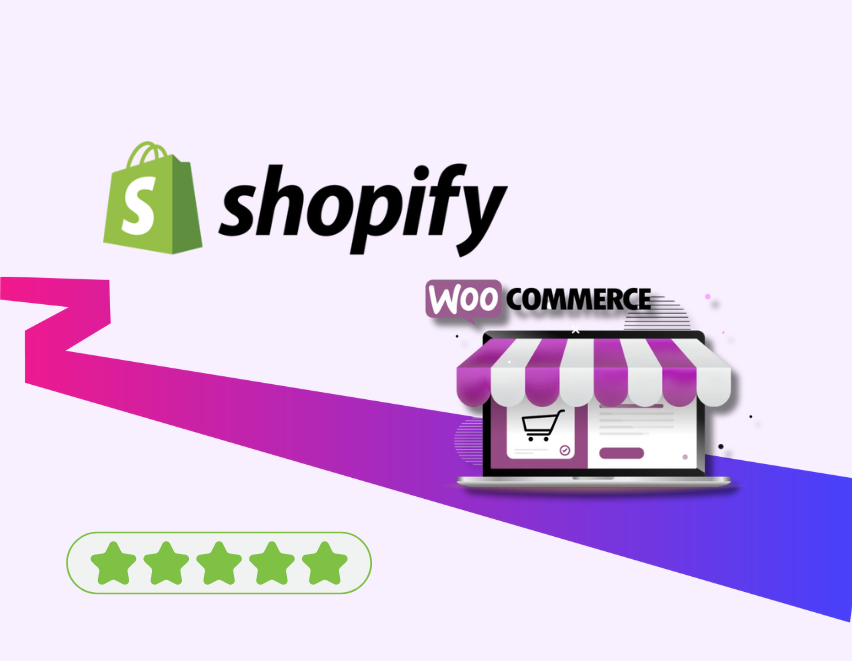Shopify and WooCommerce are two of the world’s most popular eCommerce platforms, between them boasting 5 million users who generate billions of dollars a year. But with key differences between the platforms, which is right for your eCommerce business?
Setup and UX
Shopify is geared much more toward the public, while WooCommerce has been created with designers and programmers in mind. WooCommerce entails a far steeper learning curve for business owners, whereas Shopify guides you automatically through a step-by-step setup process, at the end of which you’ll have a fully functioning eCommerce site.
Shopify’s dashboard is easy to navigate. It’s intuitive to add new products, not least because of the simple guide advising you on what details to add. WooCommerce’s dashboard is also easy to navigate and add products to, but since it’s not a subscription-based platform you’ll need to perform some integrations before you can get underway:
- purchasing a domain name
- finding a hosting account
- installing WordPress
- finding and installing a WordPress theme
These integrations are better performed by someone confident with the platform and who knows what plugins to use.
Design and themes
When you sign up for Shopify you get immediate access to over 70 free themes, as well as several paid themes, all of which are visually striking and easy to implement. There’s also a ton of design elements to explore. You might choose to purchase a theme from the Shopify store for a one-off fee.
Over at WooCommerce are hundreds of themes and designs, which can be automatically programmed to be mobile-responsive. However, with WooCommerce it takes longer to ensure your website’s design is clear and easily navigable, because every plugin has its own unique user experience to learn. On the other hand, WooCommerce is the best platform if you’re looking for a more custom layout for your eCommerce site—as long as you have the requisite time and money for its development.
Costs
Shopify has a 14-day free trial period, after which you’ll need to pay a monthly subscription fee. Its Basic package is $29 a month, its medium Shopify package is $79 a month, and its top-of-the-range Advanced package is $299 a month. All plan prices are paid annually, and include web hosting and SSL, the standard technology for keeping your internet connection secure and safeguarding any sensitive data. If you want your own domain name without your URL containing the brand name (such as Shopify), you’ll need to pay an additional $14 a year.
With Shopify, the entry-level package allows two users per account, along with unlimited product and storage space. However, it doesn’t include the use of in-platform third-party tools and add-ons. And remember, with Shopify there’s a sliding scale for transaction fees. With the Basic package you’re charged a flat fee of 2% for all transactions, while the range-topping Advanced package entails a flat fee of only 0.5% on transactions. Depending on the sales volume you’re processing, it might be worth upping your package to retain more of the overhead profit on your offerings.
Meanwhile, WooCommerce offers a free initial service, but you’ll need to pay for additional services like SSL certifications, domain names and one of the many WordPress hosting accounts. Costs for these services vary from $5 to $30. Purchasing a domain name costs an average $9 a year. Depending on how you mix and match your third-party apps for WooCommerce, you can create a website at a fairly low cost, although bear in mind you may find yourself needing to pay for several extensions in the future, like SEO plugins.
Support
While Shopify and WooCommerce both offer support, Shopify’s is much better. Shopify has a 24/7 customer service team, able to give you a fixed solution to your problem by virtue of the fact it operates on a closed platform. This results in better-documented user errors. On the other hand, as an open platform WooCommerce allows anyone to integrate add-ons, but this means the support team simply can’t have a predetermined solution for every lodged issue.
SEO
SEO is vital for making your eCommerce website discoverable on Google’s search engine results pages (SERPs). Shopify has a builtin SEO plugin and helps with basic practices, like web copy and metadata. It’s also important to note that Shopify sites load faster than WooCommerce sites, and site speed is an important SEO ranking signal. However, because it’s integrated with WordPress, which is designed specifically for blogging, WooCommerce is easier than Shopify when it comes to altering URLs, alt tags, body content, meta descriptions and lots of other on-page elements.
Dropshipping
When starting an eCommerce website you need to ensure your customers are actually receiving what they ordered. This means integrating delivery vendors into your site. Shopify has several popular options, the costs of which vary, as well as its own monthly membership fees or one-off costs for dropshipping—although then you’re limited to the platform’s own plugins. Whereas with WooCommerce you can browse hundreds of options and decide what you need. For example, if you’re a small business with only one or two deliveries a month, the best choice will be per-item delivery as opposed to a monthly subscription.
Shopify vs WooCommerce: which should you choose?
Shopify is incredibly easy to use from the beginning, and enables you to optimise your website for search within hours. It’s a more complete package than WooCommerce for business owners with neither the time nor inclination to learn more technical skills. However, Shopify is less customisable than WooCommerce because it’s a closed platform.
WooCommerce has become the behemoth of eCommerce platforms it is today because it’s basic but customisable, meaning you can build a more creative interface. Of course, creativity entails the cost of hiring a developer, which offsets the fact that WooCommerce is free in itself. WooCommerce is suggested automatically when you register an account with WordPress, giving new users an easy route to getting started. However, WooCommerce is perhaps less intuitive than Shopify—or at least requires more development experience—so you may need to devote more time to building your online store than you would with Shopify.
Shopify is the eCommerce platform for you if you want:
- a myriad of integration options
- lots of easy-to-use apps and features
- an all-in-one platform that gets everything running quickly
- a helpful and enthusiastic support team ready to assist you with any problems
…Whereas WooCommerce will be right for you if you:
- already have a WordPress website or plan to create one
- are particularly focused on ranking well for SEO on Google’s SERPs
- want to take more control of your eCommerce store or have the time to pore over its design details
- are especially interested in finding a platform that’s highly adaptable and can be scaled up by magnitudes
Choosing between Shopify and WooCommerce depends on your budget, objectives, your target audience, the experience of who’s building your website, and who will be editing and managing it. Both platforms are fantastic at what they do, and as long as you understand the inherent limitations of whichever you opt for, you’ll have an aesthetic and intuitive eCommerce website going live in no time at all!
Share
Where’s next for your brand?
No matter where you are in your marketing journey, our dazzling team of specialists will keep you moving, show you how to grow, and help you actualise the vision you’ve always secretly had for your brand.









